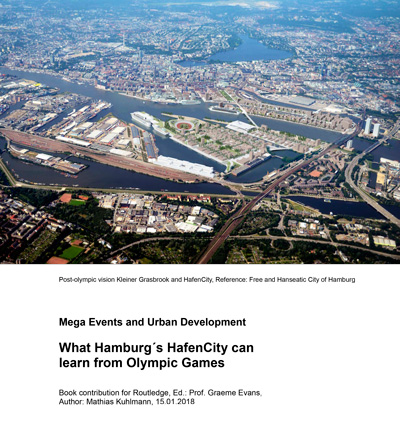Mathias Kuhlmann: „What HafenCity Hamburg can learn from the Olympic Games“
as chapter of the new Routledge book „Mega Events: Place-making, Regeneration and City-Regional Development“, edited by Graeme Evans, University of Arts London Whilst mega-events often highlight urban development they also punctuate and accelerate longer term urban regeneration and regional growth. Despite their high cost - financial, social, environmental - and risk (e.g. security, political), cities and increasingly regions look to major events and related infrastructure to lever inward investment, improve image and raise citizen morale, and generate a legacy of facilities, improved transport and international publicity and branding, in order to support economic development and growth. This is apparent in larger, developed cities where city extensions are often developed (e.g. Forum@22, Barcelona; Lisbon and Shanghai EXPOs, London Olympics); as well as in small and medium sized city-regions in more peripheral areas. The new book „Mega Events: Place-making, Regeneration and City-Regional Development“, to be released by Routledge Publisher in 2018, will present findings from the Regional Studies Association (RSA) Mega-Events Research Network (2010 - 2016) including contributions from 13 urban development experts from Europe, the United States and Canada.
Here we are pre-publishing the chapter headlined „What HafenCity Hamburg can learn from Olympic Games“. The author Mathias Kuhlmann, urban sociologist and economist from Hamburg, has systematically analysed the London 2012 Olympics, compared it with the bids of Hamburg and Paris for the 2024 Olympics and drawn conclusions for the further development of HafenCity Hamburg, currently Europe's largest inner city urban development project. As key message he points out that cities using mega events and major projects as catalysts of integrated urban development
need to overcome their typical social and economic division by applying innovative methods of broad partnerships of stakeholders and intensive civic participation in or - der to create the much evoked „City for all“.
